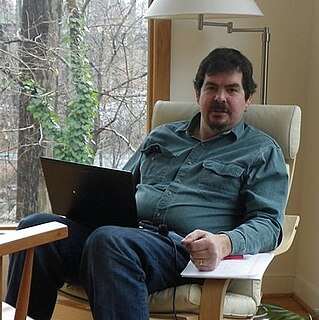Herman Ole Andreas Wold was a Norwegian-born econometrician and statistician who had a long career in Sweden. Wold was known for his work in mathematical economics, in time series analysis, and in econometric statistics.

Sir Clive William John Granger was a British econometrician known for his contributions to nonlinear time series analysis. He taught in Britain, at the University of Nottingham and in the United States, at the University of California, San Diego. Granger was awarded the Nobel Memorial Prize in Economic Sciences in 2003 in recognition of the contributions that he and his co-winner, Robert F. Engle, had made to the analysis of time series data. This work fundamentally changed the way in which economists analyse financial and macroeconomic data.

In statistics, a vector of random variables is heteroscedastic if the variability of the random disturbance is different across elements of the vector. Here, variability could be quantified by the variance or any other measure of statistical dispersion. Thus heteroscedasticity is the absence of homoscedasticity. A typical example is the set of observations of income in different cities.
In statistics, the Wald test assesses constraints on statistical parameters based on the weighted distance between the unrestricted estimate and its hypothesized value under the null hypothesis, where the weight is the precision of the estimate. Intuitively, the larger this weighted distance, the less likely it is that the constraint is true. While the finite sample distributions of Wald tests are generally unknown, it has an asymptotic χ2-distribution under the null hypothesis, a fact that can be used to determine statistical significance.
Cointegration is a statistical property of a collection (X1, X2, ..., Xk) of time series variables. First, all of the series must be integrated of order d. Next, if a linear combination of this collection is integrated of order less than d, then the collection is said to be co-integrated. Formally, if (X,Y,Z) are each integrated of order d, and there exist coefficients a,b,c such that aX + bY + cZ is integrated of order less than d, then X, Y, and Z are cointegrated. Cointegration has become an important property in contemporary time series analysis. Time series often have trends—either deterministic or stochastic. In an influential paper, Charles Nelson and Charles Plosser (1982) provided statistical evidence that many US macroeconomic time series have stochastic trends.
Takeshi Amemiya is an economist specializing in econometrics and the economy of ancient Greece.

Lars Peter Hansen is an American economist. He is the David Rockefeller Distinguished Service Professor of economics at the University of Chicago and a 2013 recipient of the Nobel Memorial Prize in Economics.
Peter Charles Bonest Phillips is an econometrician. Since 1979 he has been Professor of Economics and Statistics at Yale University. He also holds positions at the University of Auckland, Singapore Management University and the University of Southampton. He is currently the co-director of Center for Financial Econometrics of Sim Kee Boon Institute for Financial Economics at Singapore Management University and is an adjunct professor of econometrics at the University of Southampton.
Donald Wilfrid Kao Andrews is a Canadian economist. He is the Tjalling Koopmans Professor of Economics at the Cowles Foundation, Yale University. Born in Vancouver, he received his B.A. in 1977 at the University of British Columbia, his M.A. in 1980 in statistics at the University of California, Berkeley, and his Ph.D. in economics in 1982 also from the University of California, Berkeley.

Christopher Albert Sims is an American econometrician and macroeconomist. He is currently the John J.F. Sherrerd '52 University Professor of Economics at Princeton University. Together with Thomas Sargent, he won the Nobel Memorial Prize in Economic Sciences in 2011. The award cited their "empirical research on cause and effect in the macroeconomy".
Sir David Forbes Hendry, FBA CStat is a British econometrician, currently a professor of economics and from 2001 to 2007 was head of the Economics Department at the University of Oxford. He is also a professorial fellow at Nuffield College, Oxford.

In econometrics and statistics, a structural break is an unexpected change over time in the parameters of regression models, which can lead to huge forecasting errors and unreliability of the model in general. This issue was popularised by David Hendry, who argued that lack of stability of coefficients frequently caused forecast failure, and therefore we must routinely test for structural stability. Structural stability − i.e., the time-invariance of regression coefficients − is a central issue in all applications of linear regression models.
The methodology of econometrics is the study of the range of differing approaches to undertaking econometric analysis.
John Denis Sargan was a British econometrician who specialized in the analysis of economic time-series.
Whitney Kent Newey is the Jane Berkowitz Carlton and Dennis William Carlton Professor of Economics at the Massachusetts Institute of Technology and a well-known econometrician. He is best known for developing, with Kenneth D. West, the Newey–West estimator, which robustly estimates the covariance matrix of a regression model when errors are heteroskedastic and autocorrelated.
Manuel Arellano is a Spanish economist specialising in econometrics and empirical microeconomics. Together with Stephen Bond, he developed the Arellano–Bond estimator, a widely used GMM estimator for panel data. This estimator is based on the earlier article by Arellano's PhD supervisor, John Denis Sargan, and Alok Bhargava. RePEc lists the paper about the Arellano-Bond estimator as the most cited article in economics.
William H. Greene is an American economist. He is the Robert Stansky Professor of Economics and Statistics at Stern School of Business at New York University.

John Philip Rust is an American economist and econometrician. John Rust received his PhD from MIT in 1983 and taught at the University of Wisconsin, Yale University and University of Maryland before joining Georgetown University in 2012. John Rust was awarded Frisch Medal in 1992 and became the fellow of Econometric Society in 1993.
Xiaohong Chen is a Chinese economist who currently serves as the Malcolm K. Brachman Professor of Economics at Yale University. She is a fellow of the Econometric Society and a laureate of the China Economics Prize. As one of the leading experts in econometrics, her research focuses on econometric theory, Semi/nonparametric estimation and inference methods, Sieve methods, Nonlinear time series, and Semi/nonparametric models. She was elected to the American Academy of Arts and Sciences in 2019.






